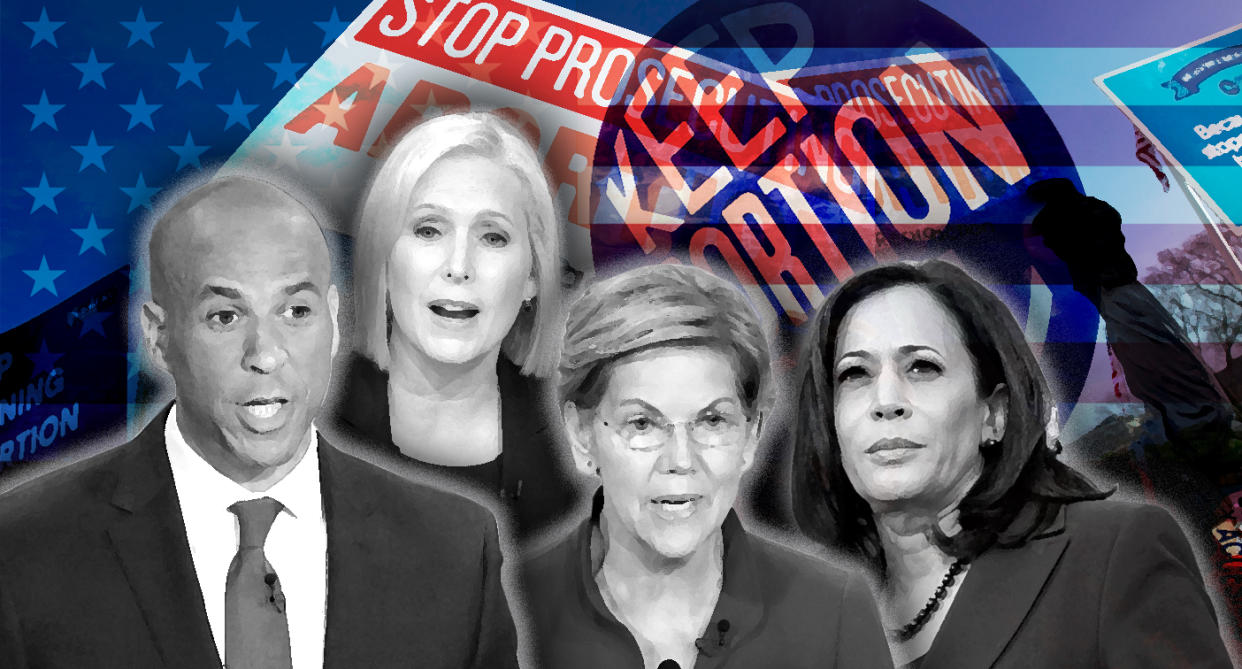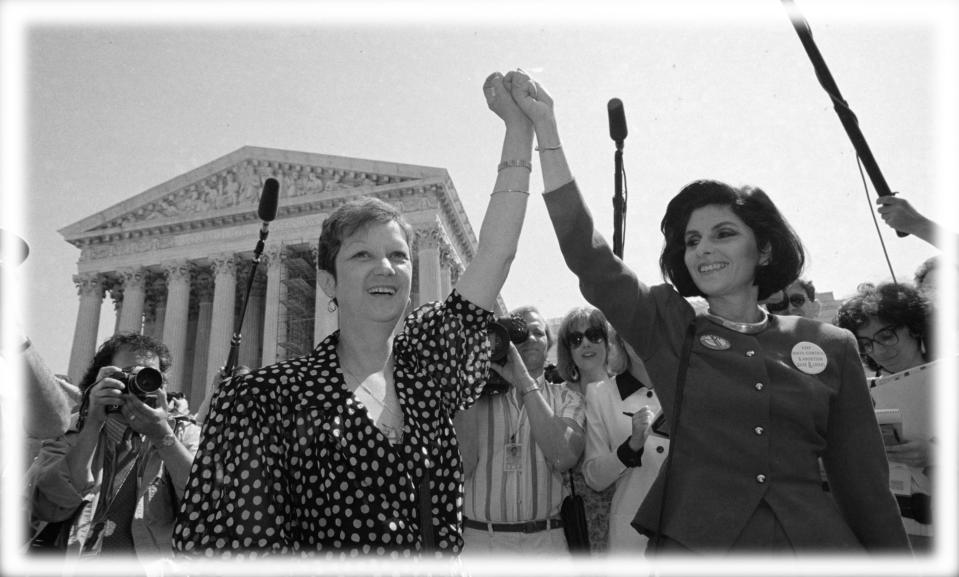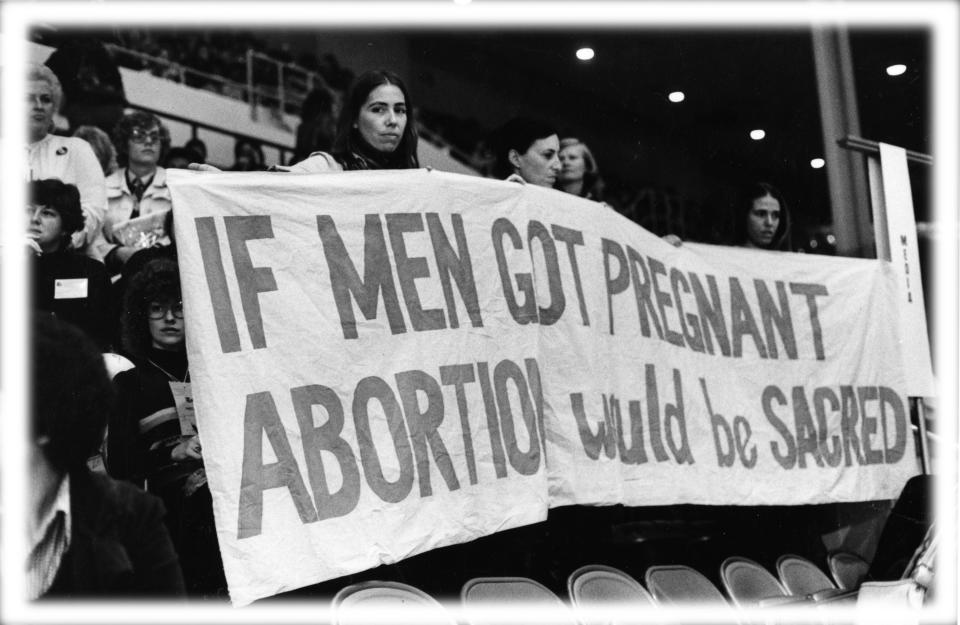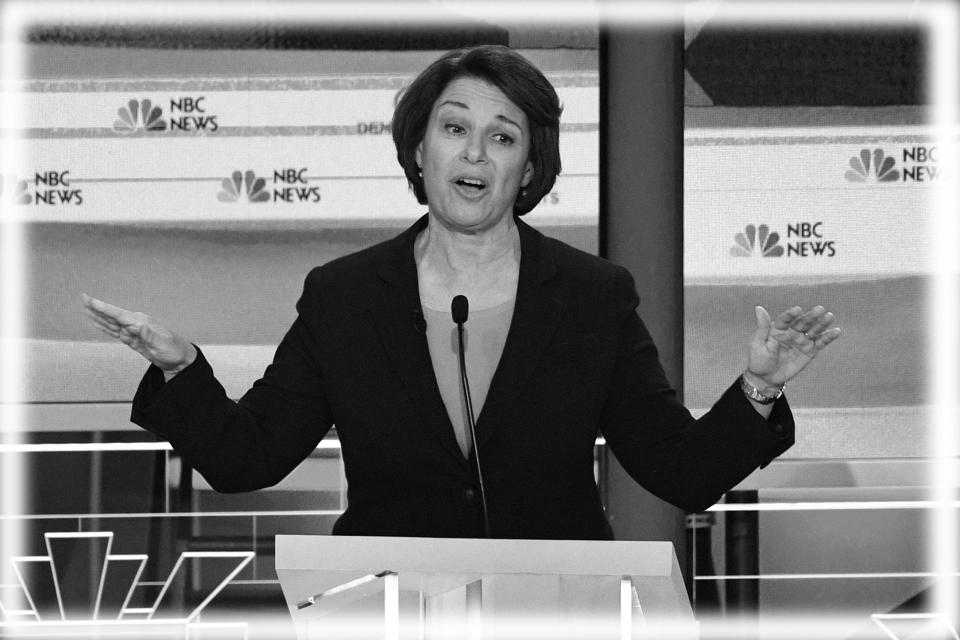For 2020 Democrats, it's all Roe, no Wade

Presidential elections are decided by many things: media exposure, financial backing, personal chemistry, timing and luck. Policy positions often are just a way of signaling where a candidate stands on the political spectrum. But 2020 is shaping up to be different, the most ideas-driven election in recent American history. On the Democratic side, a robust debate about inequality has given rise to ambitious proposals to redress the imbalance in Americans’ economic situations. Candidates are churning out positions on banking regulation, antitrust law and the future effects of artificial intelligence. The Green New Deal is spurring debate on the crucial issue of climate change, which could also play a role in a possible Republican challenge to Donald Trump.
Yahoo News will be examining these and other policy questions in “The Ideas Election” — a series of articles on how candidates are defining and addressing the most important issues facing the United States as it prepares to enter a new decade.

Is the decision to terminate a pregnancy an inalienable personal right? Or does the government and society have a compelling interest in the outcome? That question has been a political fault line in the U.S. in the 46 years since the Supreme Court decided that access to abortion was protected by the Constitution. The volume and urgency of the abortion debate has varied over those years but is now as high as it’s ever been. With Justices Neil Gorsuch and Brett Kavanaugh shifting the court to the right, the votes exist for an overturn of Roe v. Wade, which would effectively send the abortion question back to the states.

What should be the role of the federal government in a post-Roe America?
All 25 of the Democratic presidential hopefuls have declared themselves pro-abortion-rights, but only four have issued specific plans.

Abortion was declared a right under the Constitution in 1973, when the Supreme Court issued its opinion in Roe v. Wade. Rather than ending the debate, the decision launched a new chapter.
The years since the decision have seen the growth of an anti-abortion movement that has successfully chipped away at the federal right with hundreds of state laws that make abortions more difficult to access. A majority of states now have restrictions such as waiting periods, parental consent requirements and onerous clinic licensing standards.

Several times these laws have also made their way to the Supreme Court, which has upheld the underlying privacy right, but has also allowed some limitations that do not constitute an “undue burden.”
In the past two years, anti-abortion legislatures have passed laws that would effectively prohibit the procedure entirely, or almost entirely — ranging from an outright ban to outlawing abortions beyond the sixth week of pregnancy, which is before most women even realize they are pregnant. These laws are meant to provoke a legal challenge that would give the conservative majority on the Supreme Court an opportunity to overturn Roe.

A review of statements, debate answers, speeches and campaign websites show that all 25 Democratic candidates declare themselves pro-abortion-rights. Translated into policy terms, that means they support all or some of the following:
Repealing the Hyde Amendment. First passed in 1976, this congressional legislation (which is voted on yearly as part of the Health and Human Services appropriations bill) bans the use of federal funding for abortions. The effect is that Medicaid does not cover the procedure, making it unaffordable to women without other insurance in many states.

Historically even pro-abortion-rights Democrats have not attempted to reject it; the only presidential candidate to criticize it in recent years was Bill Clinton in 1992. The fact that nearly all those who are running say they will support a repeal is a measure of the changed climate around abortion. It should be noted that a president cannot overturn the rule unilaterally, but he or she can pressure Congress to do so.
Codifying Roe v. Wade. At the moment, there is no federal law guaranteeing the right to abortion. The Women’s Health Protection Act has 40 co-sponsors in the Senate and 102 in the House. It targets so-called “TRAP” laws, which are state regulations that purport to protect abortion patients’ health — widening the corridors of clinics, ensuring that clinic doctors have admitting privileges at a nearby hospital — but are actually intended to put clinics out of operation. The WHPA would prohibit states from passing restrictions that don’t “significantly advance women’s health or the safety of abortion services.”
Like repealing Hyde, a president would not be able to pass such a law, so declarations of support by candidates are largely symbolic. In addition, if passed, this law is all but assured a challenge if Roe is overturned.

Repealing gag rules, both at home and abroad. These rules prohibit any organization that receives U.S. government funds from providing abortions, or even discussing the procedure with patients. A president does have power over this rule, and starting with the Reagan administration a gag rule for organizations outside the U.S. has been instituted by every Republican president and repealed by every Democrat. The Trump administration became the first to add a domestic version, meaning no U.S. organization that receives federal family planning funds can even discuss the option of abortion with women.
A Roe litmus test for federal judges. Since Roe, it has become a bit of political theater for presidents to insist that they did not choose their Supreme Court nominees based on their abortion views, and for those nominees to insist they have no fixed views on the subject. Trump became the first president to say he would only appoint judges at all federal levels, including the Supreme Court, who were known to oppose abortion rights. Some of the current crop of Democratic candidates have said that they would apply the opposite test for their appointments, only nominating judges who are pro-abortion-rights.

Four of the candidates — Kirsten Gillibrand, Kamala Harris, Elizabeth Warren and Cory Booker — have gone a step further than these general statements of support and outlined specific policies on abortion rights. They all include the above promises, while adding others of their own.
Warren’s would guarantee both public and private insurance coverage for abortion.
Gillibrand, who has made reproductive health a central theme in her campaign, would establish a new funding stream to ensure that every state has a reproductive health center, which would not only provide abortion access but also sex education, birth control and basic health care.
Harris’s plan is modeled after the Voting Rights Act, in that it would require states whose recent abortion laws were struck down as violating Roe to obtain Justice Department approval for any future abortion legislation.
And Booker would create a White House Office of Reproductive Freedom, which would coordinate and advance not only abortion rights but also access to maternal and child health care, affordable child care and paid family leave.

Time was when politicians looked for nuance in their abortion positions. There were anti-abortion Democrats, pro-abortion-rights Republicans and many on both sides who said that while they personally opposed abortion, they respected a woman’s right to choose one for herself.
As politics has become more partisan, and Roe more vulnerable, there is less room for shades of gray. The current candidate pool includes Joe Biden, who has supported the Hyde Amendment for 40 years but recently reversed his position after facing criticism from primary opponents.
Similarly, Reps. Tim Ryan and Tulsi Gabbard began their careers opposing abortion, but now describe themselves as pro-abortion-rights.
At the first debate in Miami in June, Washington state Gov. Jay Inslee attempted to appeal to pro-abortion-rights voters saying, “I am the only candidate here who has passed a law protecting a woman’s right of reproductive health in health insurance and the only candidate who has passed a public option.”
He was swiftly rebuked by Sen. Amy Klobuchar for intimating that he, as a white man, might have more of a claim to the abortion issue than the women running against him. “I just want to say there are three women up here that have fought pretty hard for a woman’s right to choose,” she fired back.

Polls consistently show public opinion in favor of maintaining Roe, and a CNN poll in early June found that probable Democratic caucus-goers in Iowa named it their most important issue, with 79 percent calling it “crucial” to their vote.
In addition, greater numbers of Democratic voters nationwide say that abortion is now a “voting issue” for them. Until recently, Republican voters were far more likely to decide their vote based on the abortion issue. But a Pew Research Center poll during last year’s midterm elections found that 61 percent of Democratic voters said abortion is “important” or “very important” to their choice, compared with only 38 percent of Democratic voters in 2008.
The candidates, obviously, are paying attention. With frontrunner Biden now on board with repealing Hyde, abortion-rights advocates can feel assured their position will be reflected in the platform and policies of the eventual primary winner.
But as the various cases make their way up to the Supreme Court, the matter might be taken out of the hands of the nominee — whether or not he or she becomes president.
Read more from Yahoo News:



